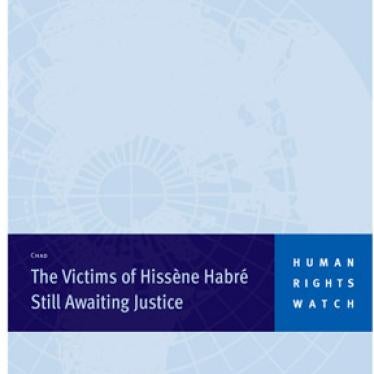(New York) - A newly proposed US law on crimes against humanity would make an important contribution to ensuring justice for atrocities committed anywhere in the world, Human Rights Watch said today.
The proposed law, the Crimes Against Humanity Act of 2009, would make it a crime under federal law to commit a widespread and systematic attack against a civilian population that involves murder, enslavement, torture, rape, arbitrary detention, extermination, hostage taking, or ethnic cleansing. The law applies to such crimes committed anywhere in the world by a US citizen or any person present in the United States regardless of nationality. Senator Richard Durbin of Illinois introduced the legislation.
"The Crimes Against Humanity Act is an important step to ensure accountability for the worst crimes," said Richard Dicker, director of Human Rights Watch's International Justice Program. "Those who commit crimes against humanity would no longer be able to escape justice by coming to the United States."
The law will significantly help to close a major loophole in US law, which has to date not addressed crimes against humanity. The law would cover such abuses as widespread murder and rape in Darfur and the Ogaden area of Ethiopia.
The Crimes Against Humanity Act is one of several laws proposed by Durbin to make international crimes prosecutable offenses in the United States. The Genocide Accountability Act and Child Soldiers Accountability Act, which were also proposed by Durbin, were passed in 2007 and 2008. The bill faces a vote by the Senate Judiciary Committee before being considered by the full Senate. Final passage will require enactment by the House of Representatives.
"The Crimes Against Humanity Act can help promote respect for human rights by sending a strong signal that there is no safe haven in the United States wherever these crimes are committed," said Dicker. "Senator Durbin's bill making these crimes punishable under US law should be enacted into law."
Human Rights Watch noted its concern that the proposed law diverges from the internationally accepted definition of crimes against humanity. Most notably, the bill requires that an attack on civilians be both widespread and systematic, as opposed to the broadly recognized standard of "widespread or systematic" attacks. This could result in a higher hurdle for bringing a charge of crimes against humanity.
The proposed legislation, rooted in existing US criminal law, differs from international definitions of crimes against humanity in other respects. For example, there are variations in the way certain crimes, such as persecution and the crime of deportation or forcible transfer of population, are defined that could limit the laws reach. It would be preferable to have US law more closely mirror international definitions of crimes against humanity.
A key issue for laws on international crimes is that they are actually applied, Human Rights Watch said. The US government made an important move in this direction with its first prosecution under a federal law that prohibits torture committed anywhere in the world in 2008, when it prosecuted Charles "Chuckie" Taylor, Jr. for torture committed in Liberia. Human Rights Watch has urged more prosecutions of this kind.
"To limit these horrific offenses, once enacted, the US government should apply the crimes against humanity law vigorously against alleged wrongdoers wherever the crimes occurred and whatever the nationality of the accused," Dicker said.







